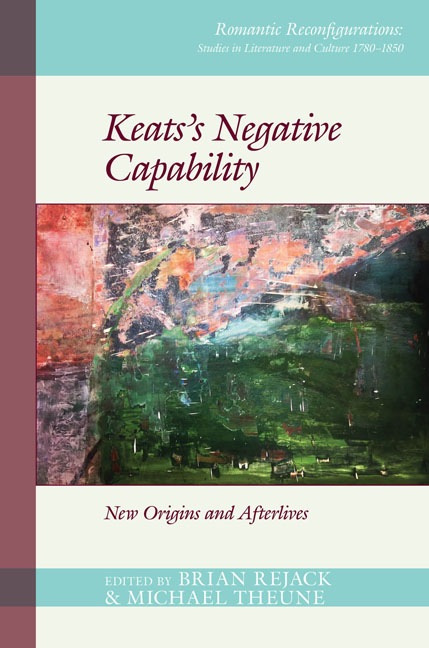Book contents
- Frontmatter
- Contents
- List of Figures
- Acknowledgments
- List of Abbreviations
- List of Contributors
- Preface
- Introduction: Disquisitions: Reading Negative Capability, 1817–2017
- Part I ‘swelling into reality’: New Contexts for Negative Capability
- Part II ‘examplified throughout’: Forms of Negatively Capable Reading
- Part III ‘pursued through Volumes’, Volume I: Negative Capability in Twentieth- and Twenty-First-Century American Poetry
- Part IV ‘pursued through Volumes’, Volume II: Adaptations, Appropriations, Mutations
- Afterword: Reading Keats's Negative Capability
- Bibliography
- Index
7 - ‘Irritable Reaching’ and the Conditions of Romantic Mediation
- Frontmatter
- Contents
- List of Figures
- Acknowledgments
- List of Abbreviations
- List of Contributors
- Preface
- Introduction: Disquisitions: Reading Negative Capability, 1817–2017
- Part I ‘swelling into reality’: New Contexts for Negative Capability
- Part II ‘examplified throughout’: Forms of Negatively Capable Reading
- Part III ‘pursued through Volumes’, Volume I: Negative Capability in Twentieth- and Twenty-First-Century American Poetry
- Part IV ‘pursued through Volumes’, Volume II: Adaptations, Appropriations, Mutations
- Afterword: Reading Keats's Negative Capability
- Bibliography
- Index
Summary
In the well-known letter of December 1817, John Keats defines ‘negative capability’ as the ability to remain in ‘uncertainties, Mysteries, doubts, without any irritable reaching after fact & reason’ (LJK, I: 193). Somewhat surprisingly, given the careful attention paid to this letter by Keats's critics, precisely what is meant by ‘irritable reaching’ has been regularly overlooked. ‘Irritability’, like many of Keats's crucial terms, carries medical and literary significance, both of which inform the account of negative capability I offer here. In this reading, Keats's famous concept describes the literary-historical and physiological nature of the writing process itself.
Irritability was often considered the biological counterpart of sensibility. While the cultural history of sensibility explores that term's physiological and literary permutations, the cultural history of irritability, a concept that also, albeit less prominently and consistently, touches on the physiological and the literary, simply doesn't exist. These circumstances are in direct opposition to two meanings that the term carried in the early decades of the nineteenth century: its association with the character of the poet, and its postulation, in eighteenth-century medicine, as the origin of muscular mobility. Keats’s critics have made much of his medical training in demonstrating that scientific concepts permeate and enhance his poetic language. What I suggest is that the medical and literary-historical meanings of ‘irritability’ illuminate the role of the body in poetic creativity and textual mediation, and that Keats’s articulation of negative capability forges a connection between the medical and the literary that warrants particular attention.
Writing to Percy Shelley after Keats's death, Byron referred to ‘that secondhand school of poetry’. Such assessments, even in the vein of praise Byron seems to adopt, have tainted Keats ever since the early criticism of his works and the branding of the Cockney school of poetry up to fairly recent assessments of Keats's ‘badness’. Keats's literary inheritance did indeed come second-hand. His knowledge of the classics was primarily through translation, his experience of Greek architecture came explicitly through imperial conquest (his sonnet responds specifically to ‘Elgin's marbles’), and his familiarity with visual art came through print reproductions more often than their painted originals.
- Type
- Chapter
- Information
- Keats's Negative CapabilityNew Origins and Afterlives, pp. 108 - 121Publisher: Liverpool University PressPrint publication year: 2019



